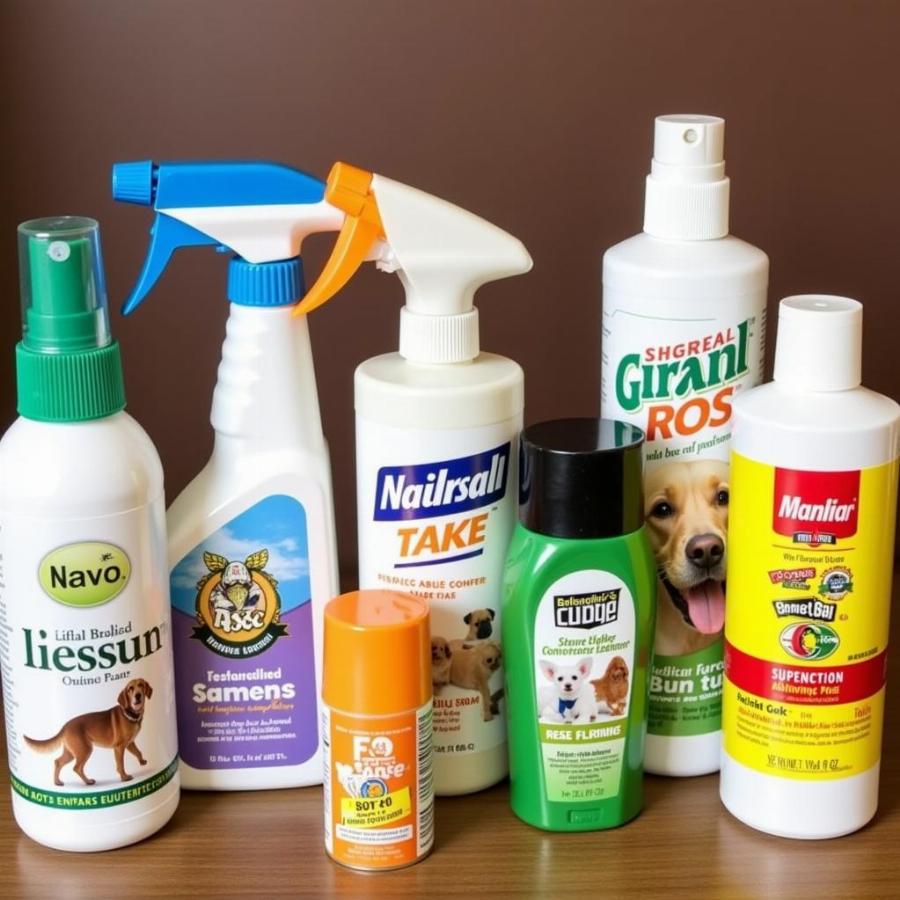Fly spray for dogs is a common topic amongst dog owners, especially during warmer months. Flies can be a nuisance, but they can also transmit diseases. Finding a safe and effective fly spray is crucial for your furry friend’s health and well-being. This article will guide you through everything you need to know about choosing and using fly spray for dogs.
Understanding the Need for Fly Spray for Dogs
Flies are more than just annoying; they can carry parasites and diseases that can harm your dog. They can also cause skin irritation and secondary infections from bites. Protecting your dog with a fly spray can help prevent these issues. However, not all fly sprays are created equal. Some contain harsh chemicals that can be harmful to dogs, especially if ingested or if used on sensitive skin.
Choosing the Right Fly Spray for Dogs
 Các loại xịt muỗi cho chó an toàn
Các loại xịt muỗi cho chó an toàn
When choosing a fly spray, look for products specifically formulated for dogs. Avoid using human insect repellents, as they often contain DEET, which is toxic to dogs. Instead, opt for dog-friendly ingredients like pyrethrins, permethrin (for dogs only, never cats!), and natural repellents like citronella and geraniol. Always check the label to ensure the product is safe for your dog’s age and breed.
Is Fly Spray Safe for Puppies?
Yes, but you need to choose a formula specifically designed for puppies. Puppies have sensitive skin and are more susceptible to the effects of chemicals. Look for gentle, natural ingredients, and always consult your veterinarian if you are unsure.
What About Natural Fly Sprays for Dogs?
Natural fly sprays are a great option for owners concerned about chemical exposure. These sprays often utilize essential oils like citronella, lavender, and lemongrass to repel flies. While generally safe, it’s essential to use them as directed and be mindful of potential allergies.
How to Apply Fly Spray for Dogs Safely
Always follow the instructions on the product label. Generally, hold the bottle 6-8 inches away from your dog’s coat and spray evenly, avoiding the face, eyes, and nose. Never spray directly onto open wounds or irritated skin. If your dog has long hair, you may need to part the fur to ensure the spray reaches the skin. Wash your hands thoroughly after application.
Other Fly Control Measures for Dogs
Besides fly spray, consider other methods to keep flies away from your dog. These include keeping your dog’s living area clean, removing dog waste promptly, and using fly traps. You can also consider using a fly mask for your dog, especially during outdoor activities. dogs spray for flies
Dealing with Fly Bites on Dogs
If your dog does get bitten by flies, monitor the area for signs of infection, such as redness, swelling, or discharge. spray for dogs for flies Clean the area with a mild antiseptic solution and consult your veterinarian if the bite becomes infected or your dog shows signs of discomfort. fly spray and dogs
Dr. Emily Carter, a renowned veterinary dermatologist, emphasizes, “Protecting your dog from flies is essential not just for comfort, but also for their overall health. Choose a safe and effective fly spray, and always follow the manufacturer’s instructions.”
Veterinary behaviorist, Dr. David Miller adds, “Keeping your dog’s environment clean is crucial in preventing fly infestations. Regular cleaning of bedding and food areas can significantly reduce the presence of flies.” permethrin for dogs
Conclusion
Choosing the right fly spray for dogs is a vital part of responsible pet ownership. By understanding the different types of fly sprays available, their proper application, and other preventative measures, you can ensure your furry friend stays protected from these pesky insects. Remember, a happy and healthy dog is a fly-free dog! leishmania in dogs
FAQ
- Can I use human fly spray on my dog? No, human fly sprays often contain DEET, which is toxic to dogs.
- How often should I apply fly spray to my dog? Follow the instructions on the product label, typically every few hours or as needed.
- What are the signs of a fly bite reaction on a dog? Redness, swelling, itching, and potential discharge.
- Are natural fly sprays effective for dogs? Yes, natural fly sprays can be effective, although they may need to be reapplied more frequently.
- Can fly bites transmit diseases to dogs? Yes, flies can carry parasites and diseases that can be transmitted to dogs through bites.
- What should I do if my dog ingests fly spray? Contact your veterinarian immediately.
- Can I use fly spray on pregnant or nursing dogs? Consult your veterinarian before using any fly spray on pregnant or nursing dogs.
Beaut Dogs is your trusted source for all things canine. We’re dedicated to providing expert advice and resources to help you care for your beloved companions. From breed information to health tips, we’ve got you covered. For personalized advice or further assistance, please contact us via Email at [email protected]. Beaut Dogs is here to help!